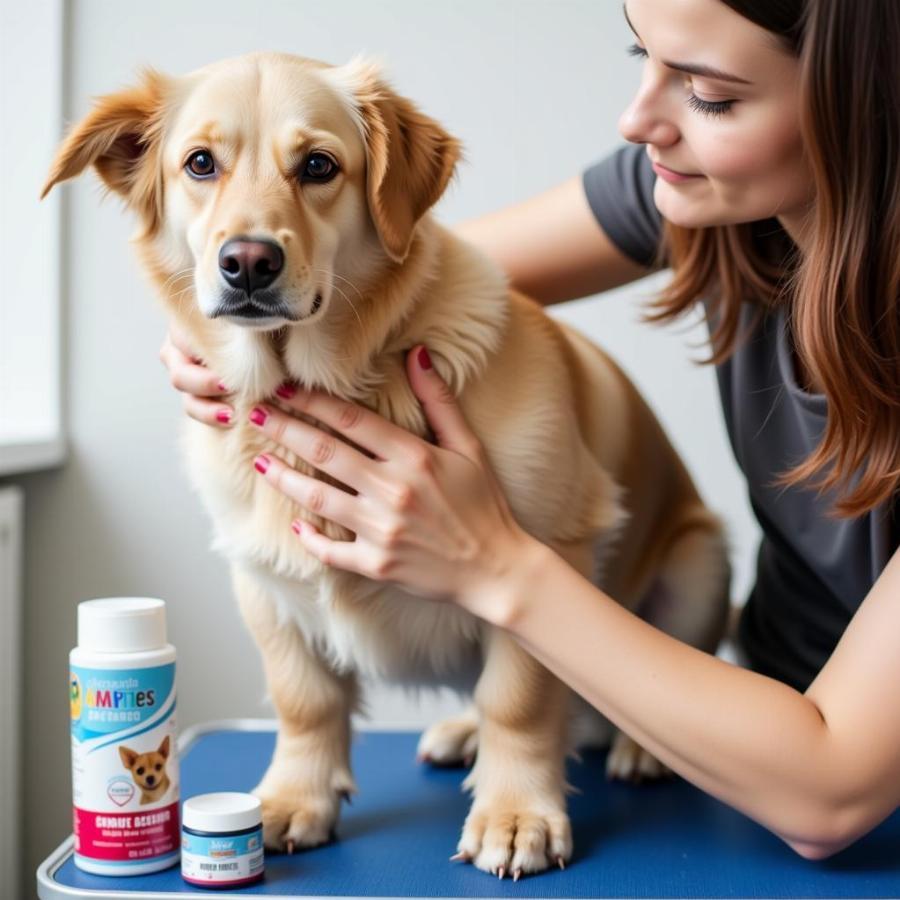Dog cream for hot spots is a must-have for any dog owner. Hot spots, also known as acute moist dermatitis, are painful, itchy skin lesions that can develop quickly on dogs. They often appear as red, oozing sores and can be caused by a variety of factors, from allergies and insect bites to excessive licking and scratching. Choosing the right dog cream can provide much-needed relief for your furry friend and help prevent further complications.
Understanding Hot Spots in Dogs
Hot spots can be incredibly uncomfortable for dogs, causing them to excessively lick, scratch, and bite the affected area. This can lead to further irritation and even infection. Recognizing the signs of a hot spot early is crucial for effective treatment. Look for red, inflamed skin, hair loss, oozing or crusting, and signs of discomfort such as whining or restlessness.
Choosing the Right Dog Cream for Hot Spots
Not all dog creams are created equal. When selecting a dog cream for hot spots, look for ingredients that offer soothing and anti-inflammatory properties. Some common ingredients include hydrocortisone, aloe vera, and oatmeal. Avoid creams with fragrances or harsh chemicals, as these can further irritate the sensitive skin.
What to Look for in a Hot Spot Cream
- Anti-inflammatory agents: Ingredients like hydrocortisone can help reduce swelling and redness.
- Antibacterial/antifungal properties: These help prevent secondary infections.
- Soothing ingredients: Aloe vera and oatmeal can help calm irritated skin.
Applying Dog Cream for Hot Spots: A Step-by-Step Guide
- Clean the affected area: Gently clean the hot spot with a mild antiseptic solution recommended by your vet.
- Dry the area: Pat the area dry with a clean towel.
- Apply the cream: Apply a thin layer of the dog cream to the hot spot, following the instructions on the product label.
- Prevent licking: Use an Elizabethan collar (e-cone) to prevent your dog from licking the area and further irritating it.
When to See a Vet
While dog cream can be effective for mild hot spots, it’s essential to consult your veterinarian if the hot spot is severe, doesn’t improve within a few days, or if your dog shows signs of infection such as fever or lethargy. Your vet can determine the underlying cause of the hot spot and recommend the best course of treatment, which may include antibiotics or other medications.
Preventing Hot Spots
Preventing hot spots is often easier than treating them. Regular grooming, parasite prevention, and managing allergies can significantly reduce the risk of your dog developing hot spots. Ensuring your dog has a balanced diet and plenty of fresh water can also contribute to healthy skin.
 Phòng ngừa hot spots cho chó
Phòng ngừa hot spots cho chó
Expert Insights
Dr. Emily Carter, a veterinarian specializing in dermatology, emphasizes the importance of early intervention: “Addressing hot spots as soon as they appear can prevent them from becoming larger and more painful. A good quality dog cream can be a valuable tool in managing this condition.”
Dr. Carter also advises pet owners to consider underlying causes: “Recurring hot spots can indicate an underlying allergy or other health issue. It’s important to work with your vet to identify and address these underlying problems.”
Conclusion
Dog cream for hot spots can be an effective way to soothe your dog’s itchy skin and promote healing. Choosing the right cream, applying it correctly, and addressing any underlying causes are crucial for successful treatment. Don’t let hot spots make your furry friend miserable – take action today to provide them with the relief they deserve.
FAQ
- Can I use human hydrocortisone cream on my dog? No, it’s best to use a cream specifically formulated for dogs.
- How long does it take for a hot spot to heal? With proper treatment, most hot spots heal within a week or two.
- What if my dog keeps licking the hot spot despite the e-collar? Consult your vet, they may suggest alternative methods to prevent licking.
- Are certain breeds more prone to hot spots? Yes, breeds with thick coats, like Golden Retrievers and German Shepherds, are more susceptible.
- Can stress cause hot spots? Yes, stress can contribute to the development of hot spots.
More Helpful Resources:
- For more information on dog safe antiseptics, check out our article on dog safe antiseptic.
- If you suspect allergies might be contributing to your dog’s hot spots, learn more about grass allergies in dogs.
- Concerned about bed bugs and your dog? Read our guide on bed bugs dogs.
- Is your dog licking a wound treated with Zymox? Find out if will licking zymox hurt my dog.
- Learn about using bacitracin for dogs.
Beaut Dogs: Your Trusted Source for Dog Care
Beaut Dogs is your go-to resource for all things dog-related. We provide expert advice and helpful tips on choosing the right breed, providing proper nutrition, and maintaining your dog’s health and well-being. When you need expert advice, contact us via Email: [email protected] for detailed and accurate information from Beaut Dogs.